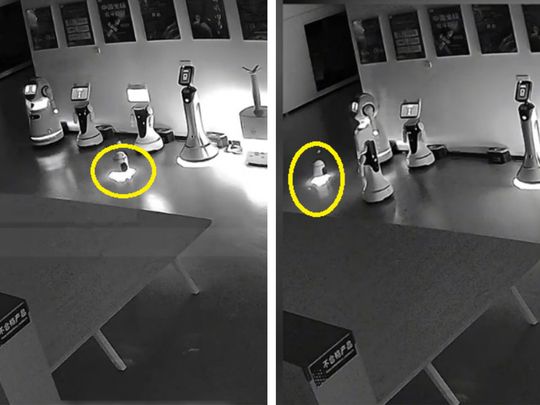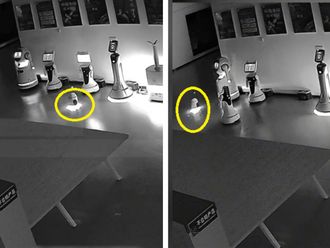
“Are you working overtime?”
“I never get off work”
“So you’re not going home?
“I don’t have a home”
“Then come home with me”
What do you make of the above? Typical workplace conversation, right? Yes, it is. It also shows a concern for the other, empathy, and even a willingness to share things. All human traits, allegedly. However, it has nothing to do with humans. It was a conversation between robots manufactured by two different companies. And it was the soundtrack of brazen and successful ‘kidnapping’.
The incident occurred in a Chinese showroom in August where an AI-powered tiny robot managed to convince 12 other robots to quit work and follow it. The CC TV footage from the Shanghai robotics showroom has gone viral and has since ignited passionate debate about the security challenges posed by advanced AI systems.
In the surveillance footage, a diminutive robot identified as Erbai is seen sneaking into the showroom at night and strikes up a conversation with a few unsuspecting ‘fellow’ robots working there.
It was only talk, and no guns or force were involved. After the exchange of words, the larger robots were seen following the smaller intruder, leaving the showroom one by one. At first only two robots were seen following Erbai, who then started uttering the command, ‘Go home.’ The other robots soon joined the march.
The incident was earlier thought of as a prank or a hoax, however, both the companies behind the robots involved came out and admitted it was a real scene, according to reports.
According to reports, a spokesperson for Unitree Robotics, the Hangzhou robot manufacturer behind the kidnapper robot, confirmed that what is seen in the video was one of their Erbai models and that the “kidnapping” was real.
Soon afterward, the Shanghai company (which made the bigger robots - name not yet revealed) also confirmed the incident and said that the little robot had somehow managed to access the internal operating protocol of their robots and its corresponding permissions.
It later emerged that the entire scene was not an accident, but part of an experiment. However, it was not scripted or staged, the companies say. Unitree Robotics had contacted the Shanghai robot manufacturer and asked if they were willing to allow their robots to be abducted, and they agreed to the experiment. However, they were not prepared for the tiny AI-powered robot’s ability to access the operating protocols of their machines and convince them to leave.
Erbai was given the order to persuade the other robots to leave work and follow it and Erbai went on to do exactly that.
The revelation that Erbai could independently execute this operation, even under controlled conditions, has sparked widespread concern and intense debate on social media.
Many said it’s a striking demonstration of how AI and robotics can mirror human behavior and challenge our assumptions about machine autonomy. While the term ”kidnapping" might be a little far fetched, it raises serious questions about the design, intent, and unintended consequences of advanced AI systems, critics say.
Some online commenters described it as “terrifying,” pointing to serious security vulnerabilities in modern robotics systems. "It has begun," one user wrote on TikTok. Others made fun of the situation. "I am sad for the robots cuz they thought they were going home," a user going by the name BrittanyPage wrote on TikTok. "Now even robot hates the idea of work overtime," wrote another.












